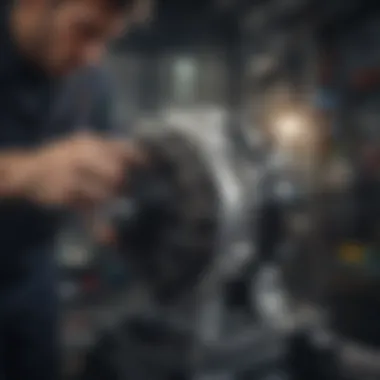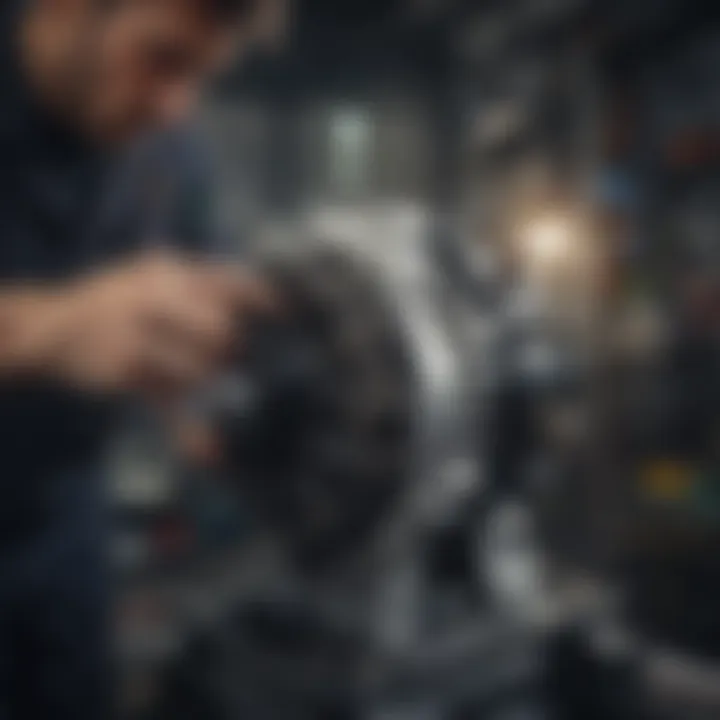Understanding the Average Cost of an Alternator


Intro
An alternator is a crucial component of a vehicle's electrical system, responsible for generating electricity to power various systems while the automotive engine runs. Understanding the associated costs of purchasing and replacing an alternator is vital for any owner. The price is not only influenced by the alternator's specifications but also the type of vehicle, quality, and labor involved in the replacement process. This article aims to dissect these elements, offering readers a comprehensive understanding of what to expect and how to budget effectively.
Vehicle Purchasing Behavior
When considering vehicle ownership, understanding purchasing behavior is essential. The type of vehicle often dictates the kind of alternator required and its cost. Several factors influence vehicle purchases.
Factors Influencing Vehicle Purchases
- Vehicle Type: Different vehicle models and brands often have varying alternator specifications. For instance, luxury cars like BMW may call for more expensive alternators compared to standard sedans.
- Brand Reputation: Consumers often lean towards well-known manufacturers, impacting purchasing decisions and their willingness to pay for quality.
- Fuel Efficiency: With the increasing focus on environmental issues, buyers often consider fuel efficiency, which in turn influences their selection of vehicles and subsequently their electrical components.
- Technology Features: Modern cars often come equipped with advanced technology that requires efficient alternators to function properly. Consumers are increasingly aware that the cost of such vehicles includes considerations for their alternators.
Demographics of Buyers
The demographic profile of vehicle buyers influences market trends and purchasing behavior. Various groups may prioritize different attributes, including:
- Age: Younger buyers may prioritize technology and style, while older buyers often emphasize reliability and maintenance costs.
- Income Level: Higher-income individuals might invest in luxury vehicles, which typically correlate with higher alternator prices.
- Location: Geographic location often dictates vehicle types, where urban residents may favor small, fuel-efficient cars, whereas rural buyers need larger vehicles for practical purposes.
Market Insights and Analysis
A deeper understanding of market dynamics can shed light on the overall costs of alternators and how they fit into consumer behavior.
Consumer Behavior Analysis
Consumers today are more informed than ever. They research and compare prices across different vendors and platforms. Online resources provide insights into both product performance and pricing, empowering buyers to make educated decisions. This transparency pushes manufacturers and retailers to offer competitive prices and improve product quality.
Competitor Analysis
In a saturated market, various brands compete to capture consumer interest. Established brands such as Bosch and Denso offer premium products while also facing competition from aftermarket alternatives like Remy.
“The competition in the alternator market has led to significant improvements in product quality and pricing.”
Prelude to Alternators
Understanding the fundamental role of alternators is essential in grasping their significance in automotive engineering. An alternator functions as a crucial component of a vehicle's electrical system, ensuring that energy is properly generated and distributed to various parts of the car. This introduction sets the stage for delving deeper into the average cost associated with these components, providing necessary insights for consumers planning for replacement or repair.
What is an Alternator?
An alternator is an electrical generator that converts mechanical energy into electrical energy in the form of alternating current. It is a vital component in modern vehicles, replacing older systems that used direct current generators. The alternator operates by converting the motion of the engine into electricity to recharge the battery and power various electrical systems when the engine is running. Unlike a battery, which stores power, the alternator generates current and makes sure that the car's battery remains charged, even when the engine is in use.
In terms of construction, an alternator typically consists of several parts: a rotor and stator, diodes, regulators, and various other components. The rotor spins inside the stator, creating an electromagnetic field that facilitates the conversion of energy.
Role of an Alternator in a Vehicle
The role of the alternator extends beyond merely generating electricity. It is involved in a complex network of systems that enhances overall vehicle performance. Here are some key functions:
- Charging the Battery: The alternator ensures the battery receives constant charge while the vehicle is running, preventing depletion and ensuring reliability.
- Powering Electrical Systems: When the engine is running, the alternator powers essential systems like headlights, dashboard lights, air conditioning, and other electronic components.
- Supporting Engine Functions: The alternator provides necessary power to facilitate the operation of engine management systems and sensors, which are critical for modern, efficient engine performance.
The reliability of an alternator is vital for vehicle operability. If it fails, the consequences can be severe, ranging from diminished electrical performance to complete engine shutdown.
"The alternator's role in modern vehicles goes beyond energy generation; it is integral to vehicle functionality and efficiency."


These aspects underline the importance of understanding both the cost implications and the operational significance of an alternator, helping consumers make informed decisions when it comes to maintenance and repair.
Average Cost of Alternators
Understanding the average cost of alternators is crucial for vehicle owners. It provides insight into the financial aspects tied to vehicle maintenance and ensures proper budgeting when replacement is needed. The cost can vary significantly based on multiple factors, which will be discussed in detail. Knowing these elements can aid consumers in making informed decisions regarding their vehicle’s electrical system.
General Price Ranges
The prices for alternators can range widely. On average, consumers can expect to pay between $100 and $500 for a new alternator. This pricing can fluctuate based on factors such as the make and model of the vehicle, the type of alternator, and where the purchase is made.
- Standard Alternators may cost between $100 to $300.
- High-Performance Alternators, typically used in performance vehicles or racing applications, can rise to around $500 or more.
- Remanufactured Alternators generally offer cost savings and are priced between $80 to $250.
- OEM Parts often sit at the higher end of the range, particularly if acquired from a dealership.
These prices do not include any additional fees for installation, which can compound the total expense of replacing an alternator.
Factors Affecting Costs
Several elements can affect the overall cost of an alternator. Below are some primary considerations:
- Type of Vehicle: The vehicle type plays a significant role in determining the cost. For instance, luxury vehicles generally have higher-priced alternators due to specialized components and design. Standard cars often have more affordable options.
- Quality and Brand of Alternator: Quality can vary significantly between brands. Premium brands like Bosch or Denso often come with higher price tags due to reputation, reliability, and warranty.
- New vs. Remanufactured Alternators: New alternators are typically more expensive than remanufactured ones. The choice between them may depend on budget and the car's age. Remanufactured options can provide a good balance of cost and reliability for many users.
- Geographical Differences: The location where the alternator is purchased can also impact the price. In urban areas, parts may cost more due to higher overhead costs for businesses. Conversely, rural areas may offer lower prices due to less competition.
Understanding these factors not only helps in budgeting for an alternator but also highlights the importance of selecting the right component for your specific automobile needs.
Factors Influencing the Average Cost
Type of Vehicle
Standard Cars
Standard cars often have a lower cost associated with alternators. The most common models feature widely available parts and straightforward designs, making replacement easier and less expensive. These vehicles typically require alternators that are mass-produced, which keeps prices competitive.
The key characteristic of standard cars is their accessibility. This makes them a popular choice for budget-conscious consumers looking to manage long-term vehicle expenses. However, a disadvantage can arise during repairs, where specialized tools may be necessary for certain luxury components.
Luxury Vehicles
Luxury vehicles represent a distinct market when it comes to alternator costs. These vehicles typically incorporate advanced technology such as smart charging systems and higher output capacity, driving the price of alternators higher than their standard counterparts. The high-quality materials used in luxury models contribute to durability but also to increased costs.
One unique feature here is the brand reputation. Consumers may be willing to pay a premium for products from well-known luxury brands, which enhances the allure but can also inflate the price. Although these vehicles may offer cutting-edge technology, the cost can be a significant consideration for buyers on a budget.
Trucks and SUVs
Trucks and SUVs present their own complexities when it comes to the average cost of alternators. These vehicles often have higher power demands due to their larger size and additional electrical components like towing packages and enhanced lighting systems. Consequently, they typically require alternators that can support these demands, leading to higher price points.
The key characteristics of trucks and SUVs include ruggedness and versatility, appealing to consumers who may need more from their vehicles. However, this strength comes with a trade-off: the increased cost of parts and potential maintenance. Consumers must weigh the advantages of power and capability against the financial implications of replacement parts.
Quality and Brand of Alternator
The quality and brand of the alternator play pivotal roles in its average cost. Well-established brands may tend to command higher prices due to perceived reliability and quality assurance. Higher-quality alternators can also reduce the likelihood of failure, thus proving more cost-effective over time despite a higher initial investment.
Conversely, opting for lesser-known brands could result in lower upfront costs but comes with a risk of reduced durability. Consumers need to carefully balance these factors against their personal preferences and intended vehicle usage.
New vs. Remanufactured Alternators
When choosing between new and remanufactured alternators, the decision usually hinges on cost versus assurance. New alternators, while expensive, offer a warranty and peace of mind regarding performance. On the other hand, remanufactured options present a budget-friendly alternative, often selling for a fraction of the cost.


Remanufactured alternators are subjected to rigorous quality checks and repairs, making them a viable option for many consumers. While they may not provide the same lifespan as new units, the initial savings can attract buyers who prioritize immediate affordability. Additionally, remanufactured units are more environmentally friendly, as they reuse existing materials.
Geographical Differences
Geographical location significantly influences alternator costs. Factors like local labor rates, availability of parts, and differences in market demand can lead to varying prices from one region to another. For instance, urban areas may have more service shops and suppliers, resulting in lower costs due to competition.
In contrast, remote areas may face higher costs due to limited part availability and higher transportation expenses. Consumers should be mindful of regional pricing trends to effectively budget for alternator replacement or repair.
Labor Costs Associated with Alternator Replacement
When considering the average cost of an alternator, it's imperative to factor in the labor costs associated with its replacement. Labor can represent a significant portion of the total expenses. This is especially true since replacing an alternator requires technical expertise. The cost of labor varies depending on the service provider, location, and the complexity of the installation.
Professionals often charge hourly rates, which can differ widely. These rates can impact the overall cost of the alternator replacement significantly. Therefore, having a good understanding of labor costs is essential for budgeting and planning.
In-House Mechanic Costs
In-house mechanics often work at automotive repair shops or dealerships. The advantage of using an in-house mechanic is their familiarity with the service provider's processes and the specific vehicles they typically work on. On average, labor costs in these establishments can range from $75 to $150 per hour.
In-house mechanics may also offer warranties on their work. This can provide peace of mind for consumers who wish to ensure quality service. However, keep in mind that the prices at dealerships often lean towards the higher end of this range.
Independent Shops and Dealerships
Independent auto shops usually present another viable option for alternator replacement. They often offer competitive labor rates compared to dealerships. Typically, you might expect to pay between $50 and $100 per hour at these locations. This can make a considerable difference in the total cost, especially for consumers looking to save money.
Furthermore, independent shops may provide a more personalized service experience. They often cater to specific local automobile needs and can offer flexibility in scheduling and service hours.
"Considering both in-house and independent options is crucial for making an informed decision about your alternator replacement."
Signs of Alternator Failure
Understanding the signs of alternator failure is crucial for ensuring the optimal performance of a vehicle. An alternator is an integral component responsible for charging the battery and powering the electrical system. When it begins to fail, it can lead to a domino effect of issues impacting both the vehicle's functionality and safety. Recognizing these signs early can help consumers avoid unexpected breakdowns and costly repairs.
Common Symptoms to Look For
Identifying alternator failure is often straightforward if you know what to look for. Here are common symptoms that indicate potential problems with the alternator:
- Dim or Flickering Lights: If dashboard lights or headlights appear dim or flicker, it often indicates that the alternator is struggling to provide power.
- Battery Warning Light: Most vehicles have a battery warning light on the dashboard. If this light is illuminated, it suggests that the vehicle’s charging system is not functioning correctly.
- Electrical Issues: Experiencing problems with electrical components, such as power windows or radio malfunctioning, may hint at alternator failure.
- Unusual Noises: A failing alternator may produce a grinding or whining noise. These sounds arise from worn bearings or other internal problems.
- Burning Smell: If you smell something burning, it can be a sign of wiring issues or overheated electrical components, often linked to alternator problems.
Diagnostic Tools
To confirm an alternator issue, various diagnostic tools can be utilized:
- Multimeter: A multimeter is vital for checking voltage levels. When the engine is running, the voltage should be between 13.7 to 14.7 volts. If it is lower, this could signify a failing alternator.
- Scan Tool: Using an OBD-II scanner can provide error codes that point toward battery and alternator issues. The tool connects directly to the vehicle's computer system to pull diagnostic trouble codes.
- Load Tester: This tool tests the battery and alternator under load. It can help determine if the alternator provides sufficient power when required.
Recognition of symptoms and early diagnostics can save both time and money. Ignoring the signs of alternator failure can lead to more severe automotive problems, potentially leaving you stranded and facing higher repair costs.
Choosing Between Repair and Replacement
Deciding whether to repair an alternator or to replace it entirely involves a careful assessment of various factors. This choice is often pivotal and can significantly impact both short-term budgets and long-term vehicle performance. Understanding the pros and cons of each option is essential for making an informed decision.
Cost-Effectiveness Analysis


When considering repair versus replacement of an alternator, cost is often the most pressing concern. Repairs usually incur lower initial expenses. For instance, if a minor issue like a loose connection arises, a simple fix can restore functionality without the need for a new part. In such cases, repair may actively prolong the alternator's life without straining finances too much.
However, it is important to evaluate potential future expenses. Common repairs may start to add up, especially if there are repeated issues with the same component. An analysis should include:
- Current condition of the alternator: Assessing the extent of damage or wear.
- Repair costs: Comparing the repair quote with the cost of a new alternator.
- Replacement costs: Including labor charges and any added features of a new alternator.
- Warranty consideration: New alternators often come with warranties, providing peace of mind.
If repair costs approach or exceed 50% of the replacement cost, it may be wise to consider a new alternator instead. Doing so could prevent recurring expenses and ensure reliability moving forward.
Long-Term Reliability Considerations
Reliability is another critical factor in the repair versus replacement dilemma. While repairs can be a cost-effective solution in the short term, they might not offer the same assurances regarding durability.
Choosing to replace an alternator typically means getting a part designed to meet or exceed manufacturer specifications. Newer models may incorporate advancements in efficiency and technology. For instance, several newer alternators feature smart charging systems that can optimize energy use better than older models.
On the other hand, a repaired alternator may lack these newer enhancements and could be more prone to failure, especially if the repairs are temporary. Therefore, it is vital to weigh:
- Age of the vehicle: Older vehicles may benefit from a replacement to avoid future issues.
- Usage patterns: Heavy usage may necessitate a new, reliable part for optimal performance.
- Environmental impact: New parts could be designed with better materials that are less harmful.
Ultimately, while repairs can be financially appealing, replacement often ensures longer-lasting operation, reducing the likelihood of future expenses. In many circumstances, investing in a quality replacement may ultimately prove more economical and reliable in the long run.
Alternative Options for Consumers
When it comes to dealing with alternator issues, knowing the available options can be crucial. This section will explore different alternatives that consumers have when faced with the need to replace or repair their vehicle's alternator. Understanding these options can lead to significant cost savings and better decision-making.
Aftermarket Alternatives
Aftermarket alternators are made by third-party manufacturers instead of the original vehicle manufacturer. These can be either new or remanufactured. They generally come at a lower price compared to factory-installed alternators. For many consumers, choosing aftermarket options is appealing due to the cost efficiency.
When considering aftermarket alternators, some factors should be kept in mind:
- Quality: While some aftermarket brands offer good quality, others may not meet the standards expected from original parts.
- Warranty: Many aftermarket alternators come with warranties, but the terms can vary widely. It’s essential to read the terms and conditions before making a purchase.
- Reviews: Researching reviews from other customers can provide insight into the reliability of a brand.
Choosing an aftermarket alternator requires careful consideration of both quality and price to ensure you are making an informed decision.
DIY Fixes and Considerations
For those who have some mechanical skills, attempting a DIY fix for an alternator issue can be an economical choice. However, this option comes with both benefits and potential pitfalls.
DIY fixes can include tasks like cleaning connections, replacing fuses, or in some cases, replacing the alternator itself if one feels confident enough to do so. The benefits of this approach can include:
- Cost Savings: Performing the repair yourself means saving money on labor costs associated with hiring a mechanic.
- Learning Experience: Gaining knowledge about your vehicle can enhance maintenance skills and prevent future problems.
Yet, DIY repairs also demand caution. Improper handling can lead to further damage and end up being more costly in the long run. Here are some considerations for those looking to pursue a DIY fix:
- Tools and Equipment: Ensure you have the necessary tools and equipment. Missing tools can complicate repairs.
- Skill Level: Honestly assess your mechanical ability. If unsure, it may be better to seek help from a professional.
- Access to Resources: Online resources and forums like Reddit can provide valuable advice and guides for specific models and problems.
In summary, understanding the alternative options available, whether selecting aftermarket parts or attempting DIY repairs, can significantly impact the cost and effectiveness of resolving alternator issues.
End
In concluding our exploration of alternator costs, it is clear that understanding the financial implications of purchasing and replacing an alternator is crucial for vehicle owners. The alternator plays an essential role in the functionality of modern automobiles, powering critical electrical components. Recognizing the different factors impacting the average cost can significantly guide consumers in making informed decisions.
Summary of Key Points
The article has shed light on several important aspects regarding alternator costs. Notably, we discussed the average price ranges and highlighted how the type of vehicle can influence costs. It is clear that brand and quality also play significant roles in determining price. Additionally, we examined the importance of considering new versus remanufactured options, which can offer varied price points and warranty terms. Cost analysis showed that labor costs, fluctuating between in-house mechanics and independent shops, contribute to the overall expense.
Final Thoughts on Alternator Costs
"The right alternator can prevent future issues and ensure the longevity of your vehicle's electrical system."
In summary, taking time to investigate the various options available for alternators can lead to better financial outcomes and improved vehicle performance.















